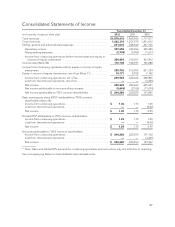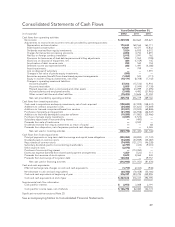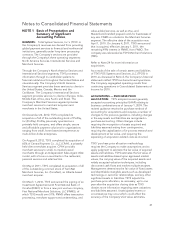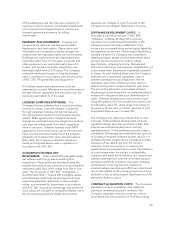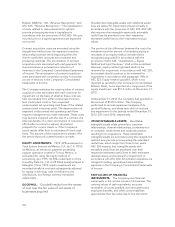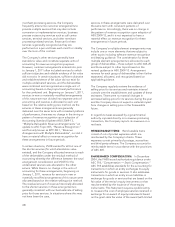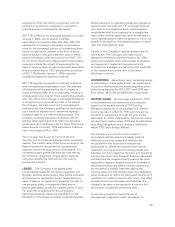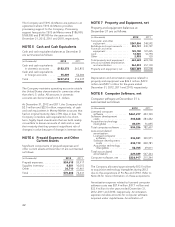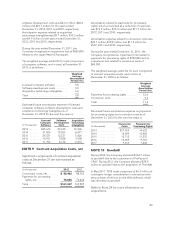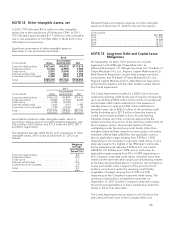NetSpend 2012 Annual Report Download - page 39
Download and view the complete annual report
Please find page 39 of the 2012 NetSpend annual report below. You can navigate through the pages in the report by either clicking on the pages listed below, or by using the keyword search tool below to find specific information within the annual report.Noncontrolling interest in earnings of subsidiaries
represents the minority shareholders’ share of the net
income or loss of GP Network Corporation (GP Net)
and TSYS Managed Services EMEA Ltd. (TSYS
Managed Services). The noncontrolling interest in the
Consolidated Balance Sheet reflects the original
investment by these shareholders in GP Net and
TSYS Managed Services, their proportional share of
the earnings or losses and their proportional share of
net gains or losses resulting from the currency
translation of assets and liabilities of GP Net and
TSYS Managed Services. TSYS has adopted the
accounting policy to recognize gains or losses on
equity transactions of a subsidiary as a capital
transaction.
RESERVE FOR MERCHANT LOSSES: The
Company has potential liability for losses resulting
from disputes between a cardholder and a merchant
that arise as a result of, among other things, the
cardholder’s dissatisfaction with merchandise quality
or merchant services. Such disputes may not be
resolved in the merchant’s favor. In these cases, the
transaction is “charged back” to the merchant, which
means the purchase price is refunded to the
customer by the card-issuing bank and charged to
the merchant. If the merchant is unable to fund the
refund, TSYS must do so. TSYS also bears the risk of
reject losses arising from the fact that TSYS collects
fees from its merchants on the first day after the
monthly billing period. If the merchant has gone out
of business during such period, TSYS may be unable
to collect such fees. TSYS maintains cash deposits or
requires the pledge of a letter of credit from certain
merchants, generally those with higher average
transaction size where the card is not present when
the charge is made or the product or service is
delivered after the charge is made, in order to offset
potential contingent liabilities such as chargebacks
and reject losses that would arise if the merchant
went out of business. Most chargeback and reject
losses are charged to cost of services as they are
incurred. However, the Company also maintains a
reserve against losses, including major fraud losses,
which are both less predictable and involve larger
amounts. The loss reserve was established using
historical loss rates, applied to recent bankcard
processing volume. At December 31, 2012, the
Company had a merchant loss reserve in the amount
of $906,000.
FOREIGN CURRENCY TRANSLATION: The
Company maintains several different foreign
operations whose functional currency is their local
currency. Foreign currency financial statements of the
Company’s Mexican and Chinese equity investments,
the Company’s wholly owned subsidiaries and the
Company’s majority owned subsidiaries, as well as
the Company’s division and branches in the United
Kingdom and China, are translated into U.S. dollars at
current exchange rates, except for revenues, costs
and expenses, and net income which are translated at
the average exchange rates for each reporting
period. Net gains or losses resulting from the
currency translation of assets and liabilities of the
Company’s foreign operations, net of tax when
applicable, are accumulated in a separate section of
shareholders’ equity titled accumulated other
comprehensive income (loss). Gains and losses on
transactions denominated in currencies other than
the functional currencies are included in determining
net income for the period in which exchange rates
change.
COMPREHENSIVE INCOME: The provisions of
ASC 220, “Comprehensive Income,” require
companies to display, with the same prominence as
other financial statements, the components of
comprehensive income (loss). TSYS displays the items
of other comprehensive income (loss) in its
Consolidated Statements of Other Comprehensive
Income, which directly follows the Consolidated
Statements of Income.
TREASURY STOCK: The Company uses the cost
method when it purchases its own common stock as
treasury shares or issues treasury stock upon option
exercises and displays treasury stock as a reduction of
shareholders’ equity.
DERIVATIVE INSTRUMENTS AND HEDGING
ACTIVITIES: ASC 815, “Derivatives and Hedging”
requires that all derivative instruments be recorded
on the balance sheet at their respective fair values.
The Company did not have any outstanding
derivative instruments or hedging transactions at
December 31, 2012.
REVENUE RECOGNITION: The Company
recognizes revenues in accordance with the
provisions of SAB No. 104. SAB No. 104 sets forth
guidance as to when revenue is realized or realizable
and earned when all of the following criteria are met:
(1) persuasive evidence of an arrangement exists; (2)
delivery has occurred or services have been
performed; (3) the seller’s price to the buyer is fixed
or determinable; and (4) collectability is reasonably
assured. The Company accrues for rights of refund,
processing errors or penalties, or other related
allowances based on historical experience.
36



